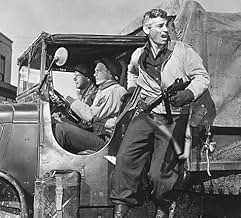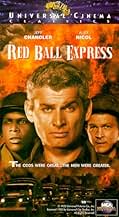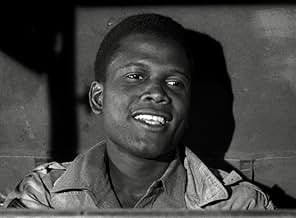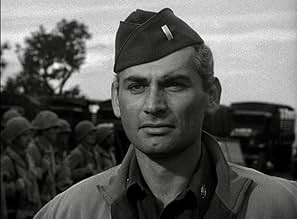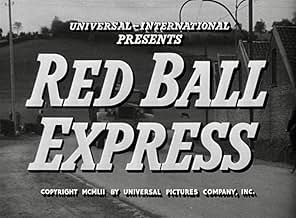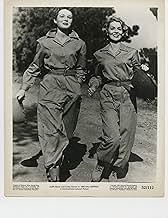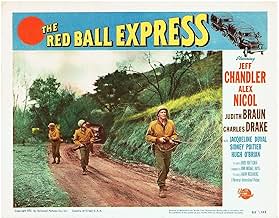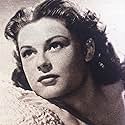Story of the military truck drivers who kept the Allied armies supplied in Europe during World War II.Story of the military truck drivers who kept the Allied armies supplied in Europe during World War II.Story of the military truck drivers who kept the Allied armies supplied in Europe during World War II.
- Director
- Writers
- Stars
Davis Roberts
- Pvt. Dave McCord
- (as Robert Davis)
Gregg Palmer
- Tank Lieutenant
- (as Palmer Lee)
Douglas Bank
- Mechanic
- (uncredited)
George Barrows
- Soldier in Bistro
- (uncredited)
Nan Boardman
- French Peasant Mother
- (uncredited)
- Director
- Writers
- All cast & crew
- Production, box office & more at IMDbPro
Featured reviews
The story was inspired by events in Louis L'Amour's life when he served in the European campaign. Louis L'Amour for those who may not know was a prolific writer of Westerns and single-handedly reinvented that literary form.
He told his WWII tales at the Brown Derby on Vine Stree in Hollywood. Louis often met with Cobb who ran the place. They often spoke of American Natives especially the Crow Indians in Wyoming and Montana. In any case, someone overheard Louis's WWII tales and it became this film.
I don't know if Louis L'Amour was ever credited. I don't think so. Much of this author's early life could easily serve as an exciting source of several entertaining and illuminating films.
He told his WWII tales at the Brown Derby on Vine Stree in Hollywood. Louis often met with Cobb who ran the place. They often spoke of American Natives especially the Crow Indians in Wyoming and Montana. In any case, someone overheard Louis's WWII tales and it became this film.
I don't know if Louis L'Amour was ever credited. I don't think so. Much of this author's early life could easily serve as an exciting source of several entertaining and illuminating films.
In Red Ball Express, a group of soldiers whose job isn't normally featured in movies gets center stage. War pictures are usually about the daring Marines or the sailors who are desperate for a taste of the action, not the folks assigned to the boring jobs. These men are the truck drivers who deliver supplies to the fellows featured in the other movies. It's an interesting angle, and if you do find that aspect of the war intriguing, you'll probably like it.
Jeff Chandler stars as the head of the platoon, and of course (since there has to be some drama in a movie that doesn't scream 'drama') he clashes with the other men. Alex Nicol holds a grudge because his brother was killed in a battle involving Jeff. There are also some testy scenes involving Sidney Poitier and the white soldiers who begrudge being assigned to an integrated unit. I've seen much more riveting war movies in my day, but if it sounds interesting to you, give it a shot and see what you think.
Jeff Chandler stars as the head of the platoon, and of course (since there has to be some drama in a movie that doesn't scream 'drama') he clashes with the other men. Alex Nicol holds a grudge because his brother was killed in a battle involving Jeff. There are also some testy scenes involving Sidney Poitier and the white soldiers who begrudge being assigned to an integrated unit. I've seen much more riveting war movies in my day, but if it sounds interesting to you, give it a shot and see what you think.
Partially filmed in Fort Eustis, VA in 1951-52. I was in the army, at Ft. Eustis, waiting for my shipping orders when the cast and crew arrived. Many of us were used as background. Before they left, they gave us a special screening with most of the actors attending. Jeff Chandler was there. I met one of the actresses, who was with the cast, but not in the picture. We had some nice chats; I saw her off when they departed. I was 12 when world war II started and all of the war films were in black and white. Even the news was in black and white. I feel that black and white and war go together. There is nothing pretty about war. All wars are, more or less, the same; why should the films be any different?
This is not my favourite from Budd Boetticher, not his best either, just a common war flick, but speaking of something rather important for US Army just after D Day for logistics matters, because all the French railway nets were destroyed. It had to be told about, I guess not other film did it. That said the cast is OK, with a convincing Jeff Chandler but not as good as in MERRIL'S MARAUDERS for instance. The real Red Ball Express took many Black soldiers who could not fight in regular troops because of racial segregation in US Army during this period. Yes, this story had to be told, but I guess many things, details have been changed from reality.
This is obviously a war film that will never be dated. Even after 60 years, it is fresh and relevant, because it tells about life the way it was in World War II, as experienced by people of the era, in a way that is credible.
We get a good mix of the "workmanship" of war, combined with "down time" and "deadly time". Chandler plays the officer who realizes how dangerous it is to be "lax", as one might be when 98% of your duty is simply workmanship, like driving, loading, and unloading supply trucks. It is the "unforeseeen" incident that gets you. It is being unready. It is the fluke or freak occurrence that will be deadly.
We have a star studded cast here, fairly common for old war films, but impossible for the twenty-first century, simply because of the dilution of movie making. Not that "dilution" is bad, but it's simply the fact that if everyone and his cousin is making a movie, then there are millions of actors, and thus no way for more than a few dozen to ever gain the sort of fame that hundreds of actors used to have.
The integration was splendid in this film, and believable. The white and black troopers behaved and spoke in a way that made you think they were from the mid twentieth century.
This is hard to do today. It is done today, but it is hard to sell that concept today. However, one must remember one thing in making World War II movies. If one makes it for the lingo of the era, as this film does, then it always remains true and credible. If one makes it for the lingo of 1990 or 2000, it will get a huge following for that generation, but in 80 years, it will be scoffed at by later generations, while films like "Red Ball Express" continue to stick around.
The acting is great, and the characters are great. Each character brings his own story to the screen, so we have many subplots. There are 3 major ones, each involving the major stars.
The subplots are handled well, and while the one with Chandler and Nicol is over the top, it is dramatic and theatrical, and well handled.
Chandler was the big star at the time. O'Brien is a minor mainstay, somehow always remaining a recognizable individual that is rare for leading man types. Poitier is a legend, with "Lillies", "Heat", "Dinner", and "Bedford" insuring his status. Drake will always remain a mainstay as a player of lovable rogues. This may be his best role, as he pretty much steals the show. Alex Nicol is the wild card. Films like this, "Then There Were Three", and "The Man From Laramie" will go back and forth to and from classic status, and he will be a huge name in classic film a hundred years from now. He probably never realized this while he was making "B" budget movies.
We get a good mix of the "workmanship" of war, combined with "down time" and "deadly time". Chandler plays the officer who realizes how dangerous it is to be "lax", as one might be when 98% of your duty is simply workmanship, like driving, loading, and unloading supply trucks. It is the "unforeseeen" incident that gets you. It is being unready. It is the fluke or freak occurrence that will be deadly.
We have a star studded cast here, fairly common for old war films, but impossible for the twenty-first century, simply because of the dilution of movie making. Not that "dilution" is bad, but it's simply the fact that if everyone and his cousin is making a movie, then there are millions of actors, and thus no way for more than a few dozen to ever gain the sort of fame that hundreds of actors used to have.
The integration was splendid in this film, and believable. The white and black troopers behaved and spoke in a way that made you think they were from the mid twentieth century.
This is hard to do today. It is done today, but it is hard to sell that concept today. However, one must remember one thing in making World War II movies. If one makes it for the lingo of the era, as this film does, then it always remains true and credible. If one makes it for the lingo of 1990 or 2000, it will get a huge following for that generation, but in 80 years, it will be scoffed at by later generations, while films like "Red Ball Express" continue to stick around.
The acting is great, and the characters are great. Each character brings his own story to the screen, so we have many subplots. There are 3 major ones, each involving the major stars.
The subplots are handled well, and while the one with Chandler and Nicol is over the top, it is dramatic and theatrical, and well handled.
Chandler was the big star at the time. O'Brien is a minor mainstay, somehow always remaining a recognizable individual that is rare for leading man types. Poitier is a legend, with "Lillies", "Heat", "Dinner", and "Bedford" insuring his status. Drake will always remain a mainstay as a player of lovable rogues. This may be his best role, as he pretty much steals the show. Alex Nicol is the wild card. Films like this, "Then There Were Three", and "The Man From Laramie" will go back and forth to and from classic status, and he will be a huge name in classic film a hundred years from now. He probably never realized this while he was making "B" budget movies.
Did you know
- TriviaLouis L'Amour's memoir, "Education of a Wandering Man", said this movie was actually based on his own war-time anecdotes. He was awarded two Bronze Star Medals while serving as an officer with the Red Ball Express.
- GoofsThe real Red Ball Express operated two separate roads for traffic (one going to the front and one for returning empty) Two-way traffic on a single road, as shown in the film , never occurred.
- Crazy creditsNo credits besides the title, seven minutes in the film.
- ConnectionsFeatured in Budd Boetticher: A Man Can Do That (2005)
- How long is Red Ball Express?Powered by Alexa
Details
- Runtime
- 1h 23m(83 min)
- Color
- Aspect ratio
- 1.37 : 1
Contribute to this page
Suggest an edit or add missing content

